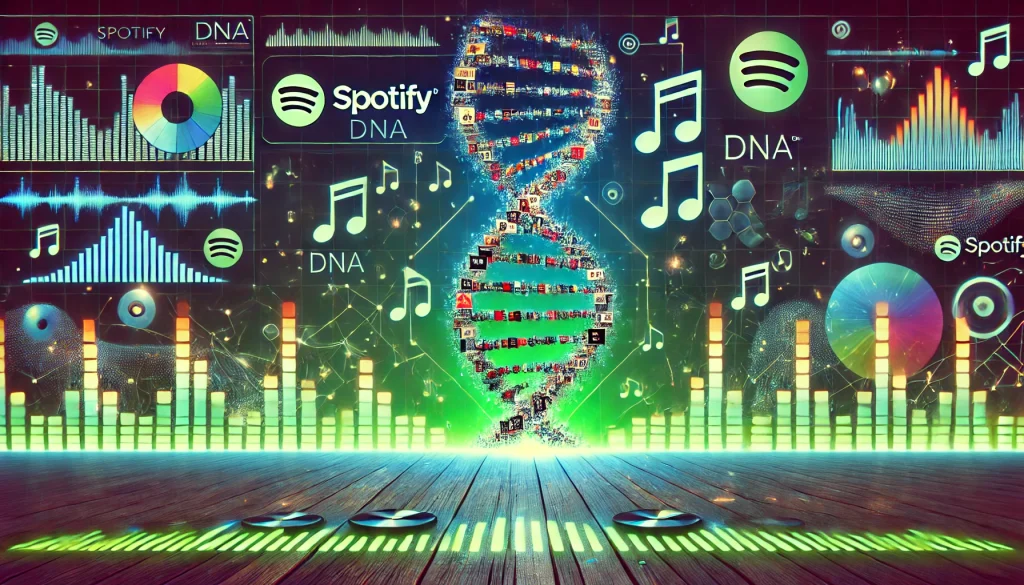Spotify DNA is a unique feature that dives deep into your listening habits, analyzing your favorite genres, artists, and songs to create a personalized profile. It goes beyond basic music recommendations, offering insights into what makes your music taste unique.
By examining patterns in your listening data, Spotify DNA uncovers trends and preferences that reflect your personality and mood. This personalized data helps enhance your overall experience, making each playlist feel like it was made just for you.
In a world where music defines so much of our identity, Spotify DNA brings a new layer of understanding to your listening journey, showing you exactly what makes up your musical fingerprint.
Understanding the Concept of Spotify DNA
Spotify DNA is an innovative feature that personalizes your music experience by analyzing listening habits and creating a unique musical profile. This feature taps into Spotify’s vast data library to understand how users interact with different genres, artists, and songs, highlighting their unique tastes.
The term “DNA” refers to the distinct musical characteristics that make each user’s listening experience unique. By analyzing these traits, Spotify DNA provides insights into the diversity of music choices, capturing the essence of each user’s preferences.
Spotify DNA aims to enhance engagement by tailoring playlists, recommending new songs, and offering insights that resonate with the listener’s personality and musical journey.
Understanding Spotify DNA helps users explore their musical identity and connect with new content that fits their evolving tastes, making Spotify much more than a music streaming app.
How Spotify DNA Analyzes Your Listening Habits
Spotify DNA collects data on how often you listen, your favorite artists, and even the time of day you enjoy certain types of music. This rich data enables Spotify to build a musical profile that feels personalized and accurate.
Through algorithms and data science, Spotify DNA evaluates aspects such as:
Frequency of listening to genres and artists.
Playtime preferences: the times of day you play specific types of music.
Skipping and replaying trends that reveal deeper preferences.
This analysis identifies patterns and creates playlists that reflect not only what you enjoy but also when you’re likely to enjoy it, improving the accuracy of recommendations and engagement.
By analyzing habits in detail, Spotify DNA offers a music experience that evolves with the listener, ensuring playlists and recommendations stay relevant over time.
Discovering the Unique Elements of Your Spotify DNA
Spotify DNA highlights several unique elements within your musical taste, including genre diversity, mood preferences, and the frequency of discovering new music. These elements collectively paint a picture of your musical identity.
Each user’s Spotify DNA is uniquely tailored, considering not only their top genres and artists but also how these preferences shift over time. For example, it recognizes when you’re exploring new music versus sticking to old favorites.
Key Elements in your Spotify DNA:
Genre diversity: Captures the variety within your music tastes.
Mood variations: Tracks mood-based listening habits (e.g., upbeat in the morning, mellow in the evening).
New discoveries: Measures how often you explore unfamiliar genres or artists.
These elements add depth to your listening profile, helping you understand how your tastes evolve and
The Impact of Spotify DNA on Personalized Playlists
Spotify DNA plays a crucial role in curating personalized playlists by analyzing user preferences and adapting to changes in listening habits. This personalized approach creates playlists that feel tailor-made for each individual.
The impact of Spotify DNA on playlists is significant. By curating music based on both long-term favorites and recent interests, Spotify ensures its playlists remain engaging. For example, weekly mixes or seasonal playlists are curated to reflect a mix of familiar tunes and new recommendations.
Spotify DNA also enhances daily mixes by factoring in mood, time, and even current events or seasons. This adaptability keeps the experience fresh and enjoyable, allowing users to discover new music without losing the comfort of their favorites.
Ultimately, Spotify DNA ensures that playlists reflect the listener’s unique preferences, enhancing satisfaction and engagement over time.
How Music Data Shapes Your Listening Profile
Music data is central to creating an accurate listening profile. By collecting details on song preferences, favorite genres, and daily listening patterns, Spotify DNA develops a profile that feels personalized and representative of the user.
Spotify collects data on factors like song frequency, artist preferences, and genre diversity. This information is essential in crafting a music profile that mirrors the listener’s true interests.
Moreover, data on playlist engagement, such as replays or skips, is analyzed to fine-tune the listening profile. These insights help Spotify predict which songs or artists will resonate with each user, making recommendations more reliable.
By shaping profiles through detailed data, Spotify DNA creates a unique experience for every listener, making their interactions with the platform more enjoyable and relevant.
The Role of Data in Spotify’s Music Recommendations
Spotify’s recommendation system relies heavily on data to create a smooth and engaging user experience. By analyzing user data, Spotify refines its algorithms to suggest music that aligns with individual preferences and listening habits.
The data-driven approach allows Spotify to track preferences, such as which songs are replayed or skipped. This feedback is crucial for refining recommendations, ensuring users are presented with music they are likely to enjoy.
Spotify’s recommendation engine is built on complex algorithms that analyze the behavior of millions of users. This broad dataset enables Spotify to recommend songs that align closely with each user’s tastes and preferences, even as they evolve over time.
Through data and algorithmic adjustments, Spotify creates a seamless recommendation process that keeps users engaged and satisfied with their music choices.
Comparing Spotify’s Analysis Tools with Other Platforms
While Spotify DNA offers personalized listening insights, other platforms like Apple Music and Tidal also provide similar tools, each with unique features and focuses. Comparing these platforms reveals strengths and limitations in Spotify’s approach to music analysis.
Spotify DNA emphasizes mood and discovery, tailoring recommendations based on diverse factors like daily listening habits and preferred genres. In contrast, Apple Music offers more curated playlists and focuses heavily on editorial recommendations, adding a human touch.
Tidal’s HiFi feature provides lossless audio quality for audiophiles, appealing to a niche segment that values sound quality over personalized insights. Each platform uses data differently, creating varied user experiences.
Comparing these tools highlights the unique benefits of Spotify DNA, particularly for listeners who prioritize a blend of personalization, mood-based playlists, and discovery-focused recommendations.
Why Personalized Playlists Matter for Music Lovers
Personalized playlists are essential for enhancing the listening experience, allowing users to connect with music that resonates with their current mood, interests, and identity. Spotify DNA plays a major role in creating these personalized playlists.
For music lovers, personalized playlists offer:
Convenience: Playlists tailored to specific times or moods, like workout or relaxation.
Discovery: Exposure to new music based on previous listening patterns.
Engagement: Frequent updates keep the playlist feeling fresh and relevant.
Spotify DNA’s playlists, such as Discover Weekly, blend familiarity with exploration, helping users find new songs they’re likely to enjoy while preserving favorites. This combination keeps music lovers engaged and continuously excited about their music experience.
How to Discover Your Personalized Music Profile
To explore your Spotify DNA, you can access personalized features like Wrapped, which offers an annual summary of your listening habits. Wrapped highlights your most-listened-to artists, genres, and songs, providing a snapshot of your musical year.
Spotify DNA tools allow you to dive deeper into the specifics, offering insights into listening patterns and revealing trends in your music taste. By accessing these features, users can understand the nuances of their Spotify DNA profile.
Discovering your profile helps you identify shifts in your music preferences, such as evolving tastes in genres or increasing interest in new artists, providing a detailed view of your musical journey.
Engaging with these tools helps users gain a fresh perspective on their tastes and discover new artists or genres that align with their profile.
The Future of Music Personalization and Data
As music streaming continues to evolve, the role of data in personalizing the listening experience is becoming more significant. The future of Spotify DNA holds potential for even more sophisticated personalization.
With advancements in artificial intelligence, Spotify DNA may one day predict shifts in user preferences before they happen, creating playlists that anticipate the user’s mood or activity. This type of predictive analysis would take personalization to a new level.
Moreover, integration with other media, like podcasts and audiobooks, could offer a seamless transition between music and spoken content, tailoring recommendations across different formats. Spotify’s commitment to data-driven insights positions it well to stay at the forefront of music personalization.
The future of Spotify DNA points toward an era where music is tailored more closely than ever to the unique preferences and daily routines of each user.
The Last Word on Spotify DNA
Spotify DNA offers an exciting glimpse into how data and music intersect to create a uniquely personal listening experience. By analyzing individual preferences and habits, Spotify DNA curates playlists that reflect each listener’s personality, making music discovery both enjoyable and meaningful. This feature transforms Spotify from a streaming platform into a musical companion that understands and evolves with its users.
The deeper insights provided by Spotify DNA help listeners connect more with their music, exploring new genres or rediscovering old favorites that resonate with them. As data-driven personalization continues to advance, Spotify DNA is set to play an even more integral role, adapting to users’ needs and bringing a fresh perspective to their playlists.
Ultimately, Spotify DNA is more than just a tool for recommendations; it’s a window into our musical identity, highlighting how music shapes and is shaped by who we are. This personalized approach to streaming redefines our relationship with music, setting a standard for how data can enhance user experiences in ways that feel both innovative and personal.


